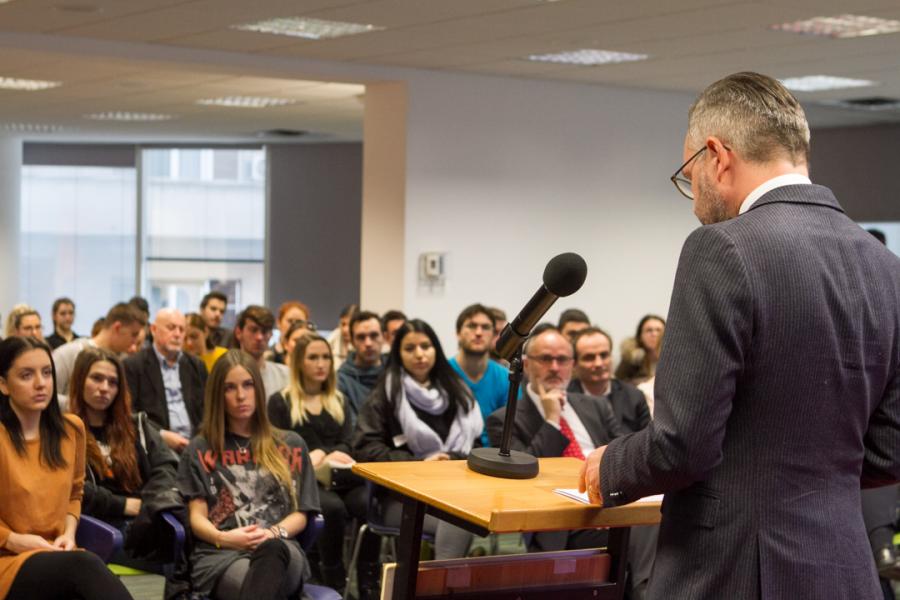By Andro Anic
For many people, it is nearly impossible to reach Europe, especially in the wake of refugee crisis and calls for closing the borders. Restrictive migration policies benefited smugglers and led to many incidents like the death of a Syrian boy who drowned on the shores in Turkey. According to the International Organization for Migration, there were 387,487 migrant arrivals to Europe in 2016, but those are only official numbers. Despite reluctance to accept the refugees in some countries, the general agreement in the EU showed the members’ unity on tackling the problem.
Croatia, a small country in the middle of Balcans and EU’s newest member, was among the states that played a vital role in dealing with refugee crisis. Croatian historian, Hrvoje Klasic, says Croatia set a good example of handling big migrant flows.
“The officials haven’t raised barbed wire on the border, the police did not act aggressively toward the refugees from the Middle East, and the public reacted positively to the fate of migrants,” says Klasic. According to him, the state met the EU requirements for accepting the refugees.
- Two migrants walk on the Serbian side of the border near Sid, Croatia September 16, 2015. Croatia found itself dragged into Europe’s migrant crisis on Wednesday as dozens walked through fields across Serbia’s border with its western neighbor, rerouted by bus after Hungary locked down its own frontier with Serbia. REUTERS/Antonio Bronic
- Migrants arrive at a refugee camp in Opatovac, Croatia, September 20, 2015. Reuters/Antonio Bronic
However, the government could still do more to integrate the newcomers, adds Klasic. “Croatia needs more people in order to grow its population, and there are lots of abandoned buildings all over the country,” he says, “We could have offered permanent homes to many families and help the people in need.”
Croatian example shows a positive aspect of refugee arrival, which is underreported. The migrant flows could benefit the countries with decreasing population and those that constantly need more labor force. Intercultural dialogue and exchange enables more refugees to join the countries as equal residents and contribute to their economies and societies.
Changing environment
According to European Commission’s Eurobarometer surveys, immigration and terrorism are seen as the most important issues facing the EU. In 2016 surveys, 68% respondents said they believed in EU’s important role on tackling those issues at the global stage.
As German Minister of State for Europe Michael Roth points out, the EU is facing a decisive moment and an existential crisis in the history of its integration. “The EU is experiencing something that national politics in many respects are also confronted with: contempt,” he says, “The very foundation of our model of a pluralist and open society is now eroding.”
- Michael Roth. Photo by Petar Vucetic
- Michael Roth. Photo by Petar Vucetic
One way to accept the changing reality is by developing new strategies and strengthening the cooperation among Europeans themselves. Such programs already exist, especially in the educational sector, and with more members joining the EU, these initiatives receive more awareness. For example, European youth benefits from mobility programs that enable students to study abroad. Non-EU students can also apply and get a scholarship to study in Europe. According to Eurobarometer, 86% of Europeans have a positive image about the programs.
Croatian Mateja Medlobi took advantage of numerous opportunities and participated in the European Parliament internship program. “Through my internship, I worked at Brussels and Strasbourg, where I got to monitor the plenary sessions,” she explains, “It was a very multicultural experience for me.” Now, Mateja is an experienced EU policy advisor and an associate at Volunteer Centre Zagreb. She is working on local and international volunteer projects to promote sustainable development. “Quick and concise transfer of information about the EU projects is important for everyone,” Mateja adds, “Authorities should work on innovative and interesting communication channels to involve more young Europeans.”
Establishing platforms for young Europeans to cooperate and exchange is an important step to strengthen the ties between the member countries. It is also an opportunity to involve non-EU talents to work and improve the EU from within. More importantly, such tools as education can help with integrating refugees. Through scholarship programs, they could learn language, necessary degrees, and get involved with the local projects.








